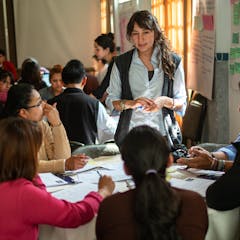
Articles on Research methods
Displaying 1 - 20 of 26 articles

Researchers uncovered the foundations of biology by using E. coli as a model organism. But over-reliance on this microbe can lead to knowledge blind spots with implications for antibiotic resistance.

Many microscopy techniques have won Nobel Prizes over the years. Advancements like cryo-ET that allow scientists to see the individual atoms of cells can reveal their biological functions.

The proteins that cover nanoparticles are essential to understanding how they work in the body. Across 17 proteomics facilities in the US, less than 2% of the identified proteins were identical.

Harmful research practices have done serious damage to Indigenous communities and created distrust. The Collaborative Indigenous Research Digital Garden is one way to repair that damage.

There is a lot of hype in psychedelics research at the moment. Here’s how to tell which research is good and which isn’t.

Researchers in sub-Saharan Africa ought to fuse conventional Western theories of knowledge and local theories of knowledge.

Tracking how people use their time is increasing in popularity, but it is a surprisingly under-used research method considering how much information it can provide in various fields.

Young people have a right to be engaged, and a right to be heard in research. When young people’s voices are included in the research process, the result is richer and more relevant research evidence.

Historically, research has been imposed upon Indigenous people, instead of conducted with them. This is an exploration of more collaborative ways to research when working with Indigenous communities.

Researchers found the letters X, Y, and Z make tweets more shareable. The nonsensical result shows how easily statistics can be misused.

Researchers rarely collect information that lets them to compare their results with what was believed beforehand. If they did, it could help spot new or important findings more readily.

New research claiming that people do not need to reduce their consumption of red and processed meat says more about the conduct and evaluation of research than it does about beef.

As our societies lose paper trails and increasingly rely on digital information, historians, and their grasps of context, will become more important than ever.

Recommended salt intake levels should be lowered further, despite previous contradictory research.

Some people argue the absence of evidence is not evidence of absence, you just need to keep looking. But there are occasions where finding no evidence is all you can do.

What contributes most to being at high risk of diabetes – diet, genes or something else? Big research questions need robust research approaches, so let’s break it down.

Important research questions can almost always be answered better with a combination of methods – where both quantitive and qualitative data play a role.

Calls to “indigenize” universities must start with listening - to Indigenous scholars and nations. And real reparation will be painful for settlers, for it will be unsettling.

The process of decolonising research methodology is an ethical, ontological and political exercise rather than simply one of approach and ways of producing knowledge.

“What have we failed to know and at what cost?” An education professor draws upon Indigenous literature to support a personal journey into classroom decolonization.

